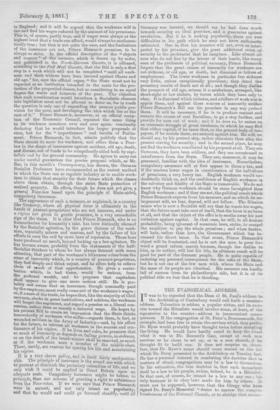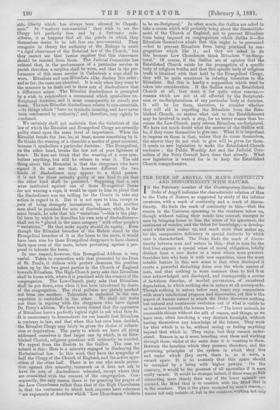THE EVANGELICAL ADDRESS.
IT was to be expected that the Dean of St. Paul's address to
the Archbishop of Canterbury would call forth a counter- address. Toleration is seldom a popular virtue, and its exer- cise toward the Ritualists would involve some, at least, of the signatories to the counter - address in inconvenient cense, quences. If the congregation of St, Peter's, Bournemouth, for example, had been free to retain the services which they prefer, Dr. Ryan would probably have thought twice before accepting the living. He would have hardly cared to keep the ritual what it was in Mr. Bennett's time, except at suoh new services as he chose to set up, or in a new church, if he thought fit to build one. It does not surprise us, there- fore, that Dr, Ryan's name should come second on the list which Dr. Perry presented to the Archbishop on Tuesday last. He has a personal interest in combating the doctrine that in matters of ritual, congregations may be a law to themselves. In his estimation, the true doctrine is, that each incumbent shall be a law to his people, unless, indeed, he is a Ritualist. In that case, of course, he cannot be a law to any one ; his only business is to obey laws made for him by others. It must not be supposed, however, that the Clergy who have signed Dr. Perry's Memorial " desire to narrow the compre- hensiveness of the National Church, or to abridge that reasoa-
able liberty which has always been allowed to Church- men." In "matters non-essential " they wish to see the Clergy left perfectly free, and by a fortunate coin- cidence, it so happens that all the points in which they themselves desire to be left free are non-essential. They recognise in theory the authority of the Bishops to exact " a rigid observance of the Rubrical law of the Church," but they cannot see that justice requires that this observance should be exacted from them. The Judicial Committee has ordered that, in the performance of a particular service in parish churches, a surplice shall be worn, and that in the per- formance of this same service in Cathedrals a cope shall be worn. Ritualists and non-Ritualists alike disobey this order ; and so far, the cases are identical. It is only when they come to the measure to be dealt out to these acts of disobedience that a difference arises. The Ritualist disobedience is prompted by a wish to reintroduce i a ceremonial which symbolises un- Scriptural doctrine, and t must consequently be sternly put down. The non-Ritualist disobedience relates to non-essentials, —to things which " have no symbolic meaning, and have never been condemned by authority," and, therefore, may rightly be condoned.
We certainly shall not maintain that the violations of the law of which the Ritualist and Evangelical Clergy are severally guilty stand upon the same level of importance. When the Ritualist breaks the law, he, at least, means something by it. He thinks the wearing of a chasuble a matter of great moment, because it symbolises a particular doctrine. The Evangelical, on the other hand, breaks the law out of pure lightness of .heart. He does not think that the wearing of a cope sym- bolises anything, but still he refuses to wear it. The odd thing about this Memorial is that the clergymen who have signed it do not see that, however different the two kinds of disobedience may appear to a third person, it is not for those actually guilty of one kind to ask that the other kind shall be punished. Supposing that a suit were instituted against one of these Evangelical Deans for not wearing a cope, it would be open to him to plead that the disobedience was too trifling for the Courts to take any action in regard to it. But it is not open to him, except on pain of being strangely inconsistent, to ask that another man shall be punished for acts of disobedience, while, in the same breath, ho asks that his "variations "—this is the play- ful term by which he describes his own acts of disobedience— shall not be " placed in the same category " with other people's " variations." He that seeks equity should do equity. Even though the Ritualist broaches of the Rubric stand to the Evangelical breaches of it as the beam to the mote, it would have been wise for these Evangelical clergymen to have cleared their eyes even of the mote, before protesting against a pro- posal to tolerate the beam.
In one respect, however, this Evangelical Address is very useful. Taken in connection with that presented by the Dean of St. Paul's, it defines with perfect clearness the position taken up by the two great parties in the Church of England towards Ritualism. The High-Church party asks that Ritualism shall be borne with, where it is practised with the consent of the congregation. The Low-Church party asks that Ritualism shall be put down, even when it has been introduced by desire of the congregation. The rival policies are plainly marked out from one another. Toleration is embodied in the one, expulsion is embodied in the other. We shall not waste our time in arguing with the clergymen who have signed Dr. Perry's address. We have never denied that the opponents of Ritualism have a perfectly logical right to ask what they do. It is unnecessary to demonstrate for our benefit that Ritualism is contrary to law, and that when this has once been decided, the Ritualist Clergy may fairly be given the choice of submis- sion or deprivation. The party to which we have all along addressed ourselves is that larger one by which, in an Esta- blished Church, religious questions will ordinarily be decided. We appeal from the Zealots to the Collies. The case we submit is this : Here is a minority engaged in disobeying the Ecclesiastical law. In this work they have the sympathy of half the Clergy of the Church of England, and the active oppo- sition of the other half. There is no one who needs protec- tion against this minority, inasmuch as it does not ask to have its acts of disobedience tolerated, except where they are committed with the consent of the congregation. Con- sequently, the only reason there is for granting the prayer of the Low Churchmen rather than that of the High Churchmen is, that the vestments to which both requests have reference " are exponents of doctrines which " Low Churchmen " believe
to be un-Scriptural." In other words, the Collies are asked to take a course which will probably bring about the disestablish- ment of the Church of England, not to prevent Ritualism from being imposed on congregations which dislike it—the Ritualists themselves admit that this ought to be prevented —but to prevent Ritualism from being practised by con- gregations which like it ; and they are asked to do this because Low Churchmen think Ritualism " un-Scrip- tural." Of course, if the Collies are of opinion that the Established Church exists for the propagation of a specific body of religious truths, and that this specific body of religious truth is identical with that held by the Evangelical Clergy, they will be quite consistent in refusing toleration to the Ritualists. But this is hardly a supposition which need be taken into consideration. If the Gallios want an Established Church at all, they want it for quite other reasons,— reasons which are not at all affected by the Scriptural. nese or un-Scripturalness of any particular body of doctrine. It will be for them, therefore, to consider whether they will aid in expelling the Ritualists from the Esta- blished Church, no matter what risk to the Establishment may be involved in such a step, for no better reason than be- ceause the Low-Church party esteem Ritualism un-Scriptural. We have not much doubt what the answer of the Collies will be, if they rouse themselves to give one. What it is important to impress on them is that, unless they do rouse themselves, the answer they do not wish to give will be given for them. It needs no new legislation to make the Established Church exclusive ; the Public Worship Act and the Judicial Com- mittee of the Privy Council have done that already. What new legislation is wanted for is to keep the Established Church comprehensive.



































 Previous page
Previous page